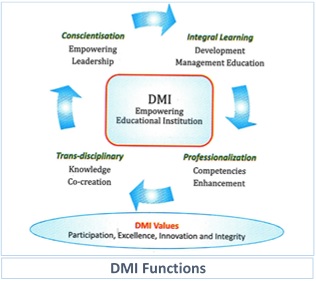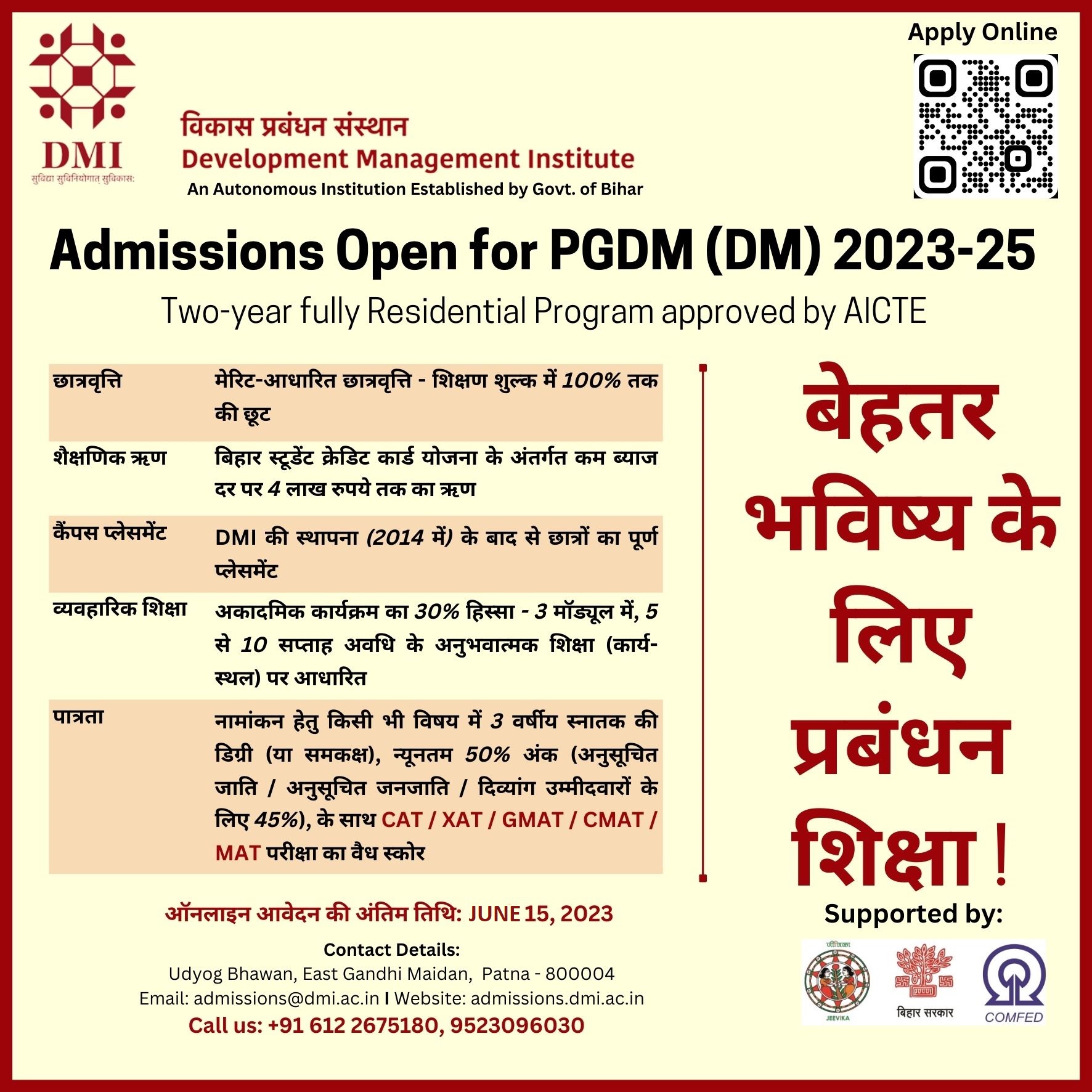Development Management Institute (DMI), Patna
Information: Right to Information
Statutory Information under RTI Act, 2005
- Introduction (Basic Information under RTI Act, 2005.
- Particulars of Organisation, Functions and Duties
- Powers and Duties of Officers and Employees
- Procedure followed in Decision Making Process
- Norms / Standards
- Official Documents and their availability
- Rules, Regulations and Instructions (the rules, regulations, instructions, manuals and records, held by it or under its control or used by its employees for discharging its functions).
- DMI Society, Board, Sub-Committees and other Bodies
- Directory of Officers and employees
- Pay Structure of Institute Staff
- The Budget Allocated
- Subsidy Programmes
- Concessions availed by the Institute
- Information available in electronic form
- Obtaining information
- Public Information Officer
-
Introduction
Institute: Development Management Institute (DMI)
Act: Right to Information Act 2005
Status: Memorandum of Association & Rules of the Institute
- Contact Person – Public Information Officer (PIO), Development Management Institute (DMI), Patna
- For Additional Information –
i. Please refer the various documents on Rules and Regulations of the Institute.
ii. Please contact the appropriate officer as per list in this hand-book or the Institute’s website.
-
Particulars of Organisation, Functions and Duties
- Establishment
Development Management Institute (DMI) was set up on February 13, 2014 pursuant to a desire of the Government of Bihar to establish a High Performing Knowledge Institution (HPKI). DMI believes that the livelihoods of small producers and marginalised people can be enhanced by organising them to form member participation based, democratically governed institutions that leverage the strengths of collectives and build enduring partnerships with professionals for reaping the benefits of technology and market integration. Inspired by and recognising the growing need for Development Management Professionals, the Government of Bihar took the initiative to establish DMI as an autonomous institution.
There is an urgent need for striking an optimal balance between societal and individual orientation through a synergetic alliance among the multiple stakeholders. DMI aims at meeting this dire need by developing managerial and leadership competencies through the processes of integral learning, professionalisation, trans-disciplinary research, and conscientisation.
- Mission / Vision and Objectives
DMI embraces collective approaches and is envisaged with a mission of providing empowering education to achieve its vision. DMI has been designed to emerge as a pioneering Empowering Educational Institution that recognizes the need for the synergetic combination of participation, management, and governance as interacting factors affecting society, and community-based organisations. In the ultimate analysis, all these institutions and organisations are embedded in society and need to recognize and serve the goals of sustainable development.
Collective approach envisions striving for the greater common good, goodwill, individual and collective gains, ecologically harmonious inclusive growth, and fulfilment of aspirations of all beings. This calls for community participation that combines the best of approaches to ensure individual participation with enlightened self-interest for improved governance effectiveness and efficient management of resources and institutions. The vision and mission of DMI emanate from this perspective and is stated as “To empower and usher in participatory governance and management of institutions, enterprise, and resources for enhancing livelihoods and generating sustainable development”.
DMI endeavors to empower grassroots through:
· Creation of a cadre of Development Management Professionals, through post-graduate academic teaching programmes;
· Enhancement of competencies for Development Management Praxis, through Competencies Enhancement Programmes (CEP);
· Orientation of Vision, Values and Leadership Practices towards Good Governance, by working with organisations and institutions at different levels; and
· Engagement in networked trans-disciplinary Action Research and Policy Advocacy, through its Collaborative Action Research and Education (CARE) centers.
The mission outlined above has been committed to by the institute since its inception. The Institute’s efforts will be towards sustain and further strengthen the objective through its various academic as well as education programmes, research and consultancy and through the CARE Centers.
- Main activities/functions of the institute
 Development Management Education, Competencies Enhancement Programmes (CEPs), Knowledge Co-creation, Empowering Leadership, Research, Consulting and Publications. The institute facilities for conduct of education, research, training and consultancy programs aimed at supporting competencies in development and institution-building efforts of government and non-government development support organisations; cooperative, community and social enterprises; Panchayati Raj Institutions (PRIs) and other agencies engaged in sustainable development of rural communities including corporate social responsibility units with special focus on marginalized section.
Development Management Education, Competencies Enhancement Programmes (CEPs), Knowledge Co-creation, Empowering Leadership, Research, Consulting and Publications. The institute facilities for conduct of education, research, training and consultancy programs aimed at supporting competencies in development and institution-building efforts of government and non-government development support organisations; cooperative, community and social enterprises; Panchayati Raj Institutions (PRIs) and other agencies engaged in sustainable development of rural communities including corporate social responsibility units with special focus on marginalized section.The pioneering activity of DMI is its two-year full-time Post-graduate Programme in Development Management (PDM) which aims at preparing its graduates to achieve:
· Personal growth by widening perspectives through Interactive Learning from perspective-building, foundational, functional and integrative courses, and enriched by learning by doing and reflective dialoguing process; and
· Transformation into Development Management Professionals by exposure to contextual realities during immersion, enterprise learning and apprenticeship modules, mediated by Experiential Learning from first-hand living and working in situ.
PDM curriculum primarily focuses on imparting competencies necessary for participatory governance and management of resources, enterprises, institutions and interventions. The curriculum is a fine mix of Interactive Classroom Learning and hands-on Experiential Learning distilled in the crucible of praxis in the diverse institutional partner network of DMI, by interspersing mutually reinforcing classroom and experiential learning at regular intervals.
The programme also offers opportunity to working executives and officials sponsored by DMI’s associate organisations. They can complete the programme over a period of two continuous years. Alternatively, they may opt for Certificate in Development Management (CDM) at the end of the first year. If sponsored to continue, the CDM holders will have the option to rejoin DMI within three years and complete the second year of the programme to obtain PGDM (DM).
DMI focuses on praxis-oriented interactive learning through a faculty team of a perfect blend of career academics, practicing professionals and practitioner-turned academics endowed with domain expertise and experience.
Management Development Program (MDP)
Management Development Program (MDP) constitute another important activity of the Institute for realization of its mission and vision, and are of two categories.
The first category of programmes are organisation-specific/client-specific and are designed and delivered as per the special requirements of individual organisations for their promoters, members, employees, and others identified by the organisations. DMI has already started working on MDPs for three of its major partners.
The second category of programmes are designed by the faculty of DMI, based on their interests and initiative to meet the needs of organisations associated with DMI. Such open programmes are communicated months in advance of their planned dates, to help the organisations sponsor the people to participate in them.
The MDPs range in duration from a few days to a few weeks, depending upon their scope and may be conducted in-house at DMI or at a venue chosen by its client organisation.
Collaborative Action Research and Education (CARE) Centers
In pursuit of its mission and vision, DMI is establishing three Collaborative Action Research and Education (CARE) Centers in the following areas:
- Livelihoods and Well-being
- Collectives and Commons
- Leadership and Governance
These centers serve as hubs for innovation and incubation. The broad activities of the above centers revolves around:
· Knowledge Management including co-creation, and establishing eco-system for propagation of best practices;
· Life Cycle Management Guidance and Support for institutions, programmes, and projects;
· Multi-stakeholder Interactive Learning; Collaborative Action Research; and Evidence-based Policy Advocacy; and
· Certificate Courses in collaboration with leading academic/research institutions.
Research, Consultation and Publications
DMI is engaged in the pursuit of academic research, supported by its consulting activities that it provides to its client organisations. Apart from helping the clients in solving their critical managerial and organizational issues, the consulting activities provide a rewarding experience for its faculty members in handling live management problems, and form the basis for many cases, research articles and other publications that feed into and, in the process, add to the richness of its PDM and CEPs.
Academic Events
DMI organizes on a regular basis several workshops, symposia, seminars, and similar events on a variety of topics and issues relevant to its mission. Such academic events are either a part of its CEPs and CARE centres, or are integrative and bring together concerns of several CEPs and CARE centers. The academic events are attended by leading academics, practicing Development Management Professionals and thought-leaders in the arena of Development Management.
Functions of the Institute:
· To select and train outstanding young persons and create a cadre of development management professionals;
· To award degrees, diplomas, certificates, and other distinctions to candidates trained, and to prescribe standards of proficiency before the award of such degrees, diplomas, certificates and other distinctions;
· To enhance the competencies of development management practitioners;
· To orient vision, values and leadership behaviour of people’s representatives including Panchayati Raj Institutions ( PRIs), collective enterprises and community organisations;
· To network with partner organisations and engage in action and policy research;
· To create knowledge repository and disseminate knowledge through publication and creation of digital and multi-media platforms;
· To institute and award fellowships, prizes and medals in accordance with the rules and bye-laws;
· To fix and demand such fees and other charges as may be laid down in the bye-laws made under the rules of the society;
· To establish, maintain and manage infrastructure facilities including offices, residences, education, training complexes, canteens and hostels for faculty, student, participants and staff;
· To co-operate with educational and other institutes in any part of the world having objects wholly or partly similar to those of the society by exchange of teachers, scholars in such a manner as may be conducive to common objects.
· To make rules and bye-laws for the conduct of the affairs of the Society and to add, amend, vary or rescind them from time to time;
· To acquire and hold property; to deal with any property belonging to or vested in the Society in such manner as the Society may deem fit for advancing its objects;
· To accept grants, donations, assistance loans from financial institutions, banks, public bodies, corporations, companies or persons or trusts/corporations/companies and foundations for the purposes of the society and to manage efficient, effective and permissible fund flow and fund utilization in consonance with the objects stated herein;
· To maintain a fund to which shall be credited by:
i. All monies received as membership fees;
ii. All monies provided by the central and the State Governments;
iii. All fees and other charges received by the society;
iv. All monies received by the society by way of grants, gifts, donations, benefactions, bequests of transfers, and
v. All monies received by the society in any other manner or from any other sources.
· To create special funds by allocation of monies from the fund for specific purposes and to deposit all monies credited to the fund in such banks or to invest them in such manner as the society may decide;
· To pay salary/wages/fee including consultancy, retainer ship fee, sitting fee, rent and incur all other expenses needed in fulfilment of the objects of the Society;
· To enter into any agreements with any Government(s) or authorities whether Central, State, municipal, local or any other person, that may seem conducive to the objects of the Society;
· To pay all expenses, preliminary or incidental to the formation of the Society and its registration;
· To establish, support, or aid in the establishment of associations, institutions, funds and trusts as may be required in furtherance of the objects of the Society;
· To collect fee including membership fee, service charges, consultancy charge, compensations or such other monies as may be required in due course of functioning of the Society and in furtherance of its objects;
· To take membership in any other society or association, with objects similar to its own;
· To prepare and maintain accounts and other relevant records and to prepare an annual statement of accounts;
· To constitute such committee or committees as it may deem fit for the disposal of any business of the Institute;
· To delegate any of its powers to the Board of Governors of the Institute or any of the committee or committees constituted by it;
· To appoint legal and technical advisers (not being members), bankers for the society and to pay the necessary expenses for the same; and
· To do generally all such other lawful things as may be incidental to or conducive to the attainment of the above objects.
- Organisation Structure
Prof. Debiprasad Mishra, Director, DMI
Email: director[@]dmi.ac.in
Link to view the Organisation Structure
- Address of the Institute
Registered Office:
Development Management Institute Society,
JEEViKA, BRLPS, 5th Floor, Biscomaun Bhawan,
Near Gandhi Maidan,
Patna – 800001, Bihar.
Transit Campus :
Development Management Institute (DMI),
2nd Floor, Udyog Bhawan, East Gandhi Maidan,
Patna-800004, Bihar, India.
Institute working hours
Teaching: (as per academic planner)
Administration: 09:30 am to 06:00 pm (Monday to Friday)
Saturday and Sunday – Holiday
3. Powers and Duties of Officers and Employees
The institute’s apex governing body is the Board of Governors. The general superintendence, direction and control of the affairs of the Society and its income and property are vested with the Board of Governors headed by the Chairman, Board of Governors. The Director (ex-officio Member-Secretary of the BoG) is the Principal Academic and Executive officer of the Institute. The Director is responsible for routine administration and management of the Institute, reports to the Board and have the appropriate and requisite powers delegated by the Board.
The Chairman, Director is vested with academic, financial and general powers under the ‘Delegation of Powers’ approved by the Board of Governors from time to time. The institute takes the decision regarding academic matters, students’ affairs, staff affairs, finance, facilities of the Institute and infrastructure.
Dean Administration, Dean Academic shall advice the Director on academic and administrative issues. The manager Admin will assist them in administrative matters.
Powers and Duties of Other Employees and Work Allocation
As per the power sub-delegated by the Competent Authority, the Programme Coordinator has certain administrative and financial powers for smooth functioning of the various activities of the Institute.
The employees are performing the assigned duties in the designated level of teaching and non-teaching workforce including Faculty members, Librarian, Managers designated other administrative staff members managing the overall activities in academic and non-academic segments.
4. Procedure followed in decision-making process
The Institute has the Chairman, Board of Governors, Director, Dean Administration and Dean Academics, Manager Admin, who carry out the various functions of the Institute as per the procedures laid down in the Rules and Regulations of the Institute and other manuals such as the H R Manual and the Finance and Accounts Manual. The decision is communicated to the public by announcements, advertisements and through the website. The final authority to vet the decisions is the Director, Chairman and Board of Governors. The Institute takes the decision regarding academic matters, finance, facilities of the Institute, infrastructure, staff affairs, and student affairs.
5. Norms / Standards
Norms and standards for various programmes of the Institute are set by the respective committees which monitors the achievements and progress pertaining to various programmes belonging to different departments.
6. Rules, regulation and instruction used As mentioned in the Bye-Laws of the Institute.
7. Official documents and their availability
- Society Registration Certificate
- Memorandum of Association
- Rules and Regulations
- Annual Report
- HR Manual
- Finance Manual
- Research and Publications
- Degree / Diploma granting programmes
- Faculty Profile
- Admissions brochure
- Placements brochure
8. Board, Sub-Committees and other bodies
- DMI Society
- Board of Governors
- Other committees as per the guidelines of the AICTE
- Internal Committees to look after the day to day affairs of the Institute
Meetings of the DMI Board and its Sub-Committees are available on submission of application, subject to confidentiality.
9. Directory of Officers and Employees: Click here
10. Pay Structure of the Institute Staff
The pay scale for Faculty and Staff are as per the 7th pay commission
11. The Budget Allocated
Rural Development Department of Government of Bihar has allocated a budget of Rs.30.00 Crores for the Financial Year -2018-2019
12. Subsidy Programmes
For the Post-Graduate Programme in Development Management, DMI provides a generous merit-based fee waiver based on performance during PDM up to 100% of tuition fee – term wise.
|
Programme Fee |
Scholar Support (Scholarship Scheme) |
|||||
|
1 |
Term I |
1,09,000 |
# |
GPA |
Scholarship |
|
|
2 |
Term II |
1,27,000 |
1 |
2.67-2.99 |
25% of tuition fee |
|
|
3 |
Term III |
1,27,000 |
2 |
3.00-3.32 |
50% of tuition fee |
|
|
4 |
Term IV |
1,30,000 |
3 |
3.33-3.66 |
75% of tuition fee |
|
|
5 |
Term V |
1,07,000 |
4 |
3.67 and above |
100% of tuition fee |
|
13. Concessions availed by the Institute
The institute is registered u/s 12A and 80G of the Income Tax Act. The institute is also registered under FCRA
14. Information available in Electronic Form
All the relevant information about the Institute is available on its website.
Please refer: http://dmi.ac.in
15. RTI Applications Received
16. Public Information Officer
The Public Information Officer,
Development Management Institute (DMI),
Second Floor, Udyog Bhawan,
East Gandhi Maidan,
Patna – 800004
Appellate Authority
Director, DMI







